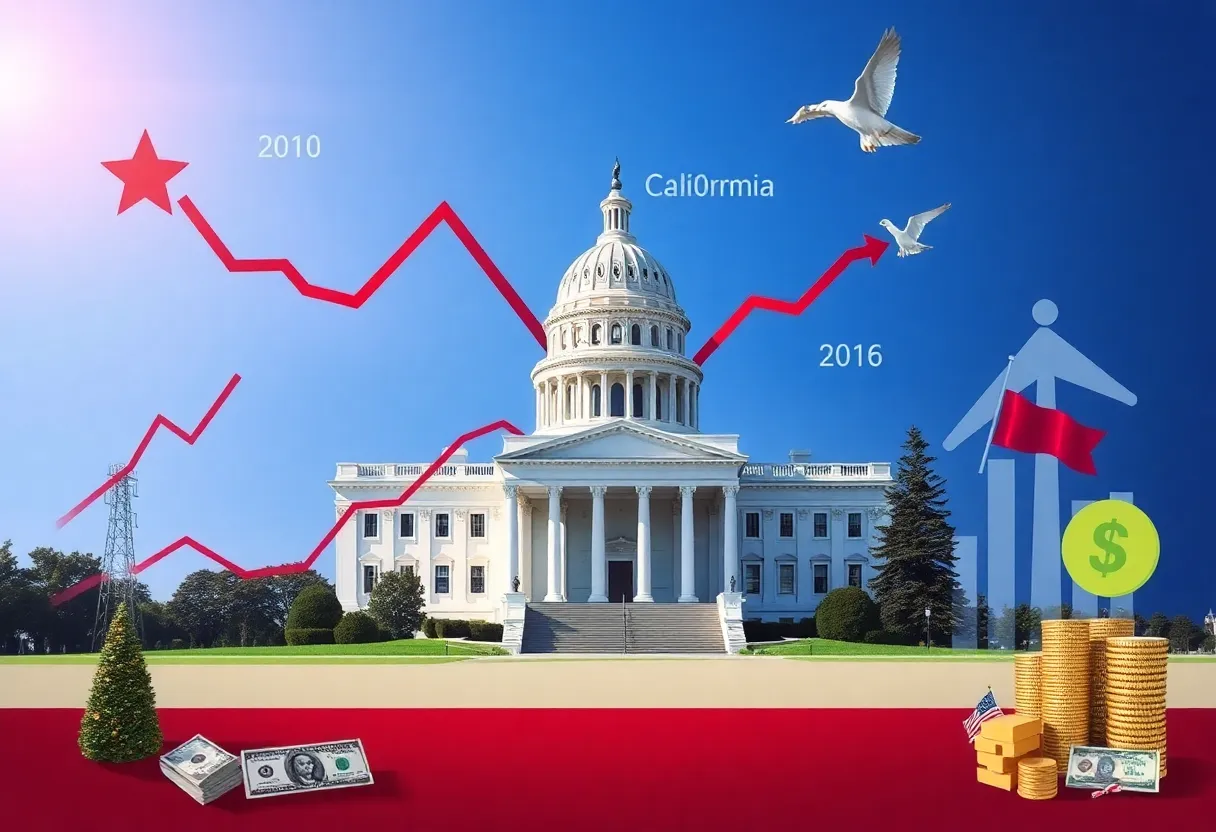News Summary
California is confronting a budget shortfall of $10 billion, potentially escalating to $20 billion due to economic uncertainties and rising Medi-Cal funding challenges. Governor Gavin Newsom prepares for budget revisions amid concerns over ‘fake numbers’ in revenue projections. The state’s financial outlook has shifted dramatically since earlier surpluses were reported, signaling difficult negotiations ahead for lawmakers. With critical funding for programs at stake and potential federal cuts looming, state leaders must navigate this precarious fiscal situation carefully.
California is facing a significant budget shortfall, with Governor Gavin Newsom confronting a potential deficit of $10 billion. This figure could escalate to $20 billion or more if current economic trends persist. Key factors driving this financial crisis include President Donald Trump’s tariff policies, issues surrounding Medi-Cal funding, and delays in tax filings related to recent wildfires.
State lawmakers have been alerted to prepare for this substantial budget gap ahead of Newsom’s revised budget presentation. In stark contrast to earlier projections made by the Department of Finance in January, which estimated a small surplus for the state, the latest forecasts highlight a troubling shift in the state’s financial outlook.
Lawmakers have raised concerns that they may be forced to approve a budget filled with “fake numbers” due to uncertainties surrounding future revenue collections. Although income tax receipts have surpassed projections by approximately $4 billion, the escalating tariffs and rising prices threaten to impede revenue growth moving forward.
In the wake of these developments, Newsom signaled that his revised budget will incorporate a reduced economic outlook, projecting a decline in GDP, an increase in unemployment, and substantial inflation rates. The approaching budget negotiation process is expected to involve discussions between Newsom and key legislative leaders, including Assembly Speaker Robert Rivas and Senate President Pro Tem Mike McGuire. The objective remains to finalize a comprehensive spending plan by the end of June.
Furthermore, the budget deliberations could be elongated as Congress has yet to adopt a federal spending plan, which may necessitate modifications in response to anticipated federal cuts. This uncertainty places several state-funded programs, such as Medi-Cal and local homelessness grants, at risk, with potential shifts in financial burdens being pushed onto California by congressional Republican leaders.
Medi-Cal Funding Challenges
Amidst the broader budget crisis, California’s Medi-Cal program is also grappling with an additional funding requirement of $2.8 billion, which compounds a prior $3.4 billion loan needed to ensure critical payments. The surge in Medi-Cal enrollment, particularly among undocumented immigrants, along with rising pharmacy expenses, have been pivotal factors contributing to the overspending.
The financial challenges surrounding Medi-Cal have prompted criticism from certain Republican segments of the California legislature, who have contended that the commitments made by Governor Newsom and the Democratic majority were overly ambitious and unrealistic. In contrast, Democratic leaders emphasize the significance of the Medi-Cal expansion as essential for maintaining health coverage during the ongoing pandemic.
The implications of national Medicaid cuts, as proposed by House Republicans, forebode potential losses for California amounting to between $10 billion and $20 billion annually. Officials assert that such a loss would be untenable for the state to compensate without additional federal funding support.
Conclusion
The confluence of these challenges presents a multifaceted and contentious environment as California transitions into its budget negotiation period. The intertwining issues of tariff impacts, Medi-Cal funding deficiencies, and fluctuating economic indicators necessitate careful consideration and strategic planning by state leaders in order to navigate these fiscal uncertainties effectively.
Deeper Dive: News & Info About This Topic
- Politico: California Faces $10 Billion Budget Deficit
- Wikipedia: California State Budget
- California Globe: Newsom Signs Bill on Medi-Cal Deficit
- Google Search: California budget deficit
- Independent: California’s Medi-Cal Shortfall Hits $6.2 Billion
- Encyclopedia Britannica: Medi-Cal
- Los Angeles Times: Budget Cuts Could Close Hollyhock House
- Google News: Medi-Cal funding California

Author: STAFF HERE MISSION VIEJO WRITER
The MISSION VIEJO STAFF WRITER represents the experienced team at HEREMissionViejo.com, your go-to source for actionable local news and information in Mission Viejo, Orange County, and beyond. Specializing in "news you can use," we cover essential topics like product reviews for personal and business needs, local business directories, politics, real estate trends, neighborhood insights, and state news affecting the area—with deep expertise drawn from years of dedicated reporting and strong community input, including local press releases and business updates. We deliver top reporting on high-value events such as Oso Fit 5K Fun Run and Community Health Fair, Walk Against Drugs & Community Fair, and National Night Out. Our coverage extends to key organizations like the Mission Viejo Chamber of Commerce and Providence Mission Hospital Mission Viejo, plus leading businesses in retail and education that power the local economy such as The Shops at Mission Viejo, Capistrano Unified School District, and Amazon Delivery Station. As part of the broader HERE network, including HEREAnaheim.com, HEREBeverlyHills.com, HERECostaMesa.com, HERECoronado.com, HEREHollywood.com, HEREHuntingtonBeach.com, HERELongBeach.com, HERELosAngeles.com, HERESanDiego.com, and HERESantaAna.com, we provide comprehensive, credible insights into California's dynamic landscape.


